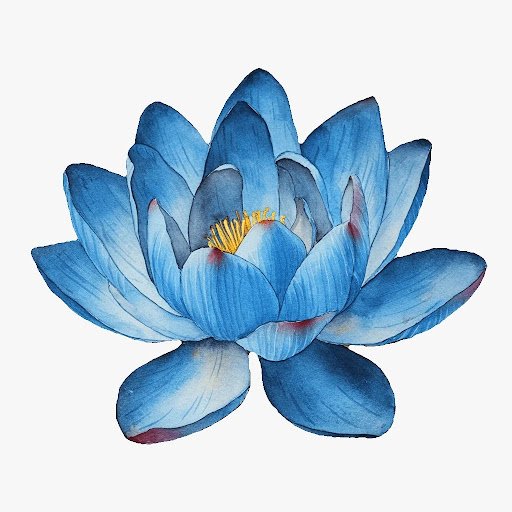In the world of herbal teas, Blue Lotus Flower Tea stands out for its mystical history, calming effects, and natural healing properties. Revered for centuries by ancient civilizations like the Egyptians and used in spiritual rituals, this tea is now gaining popularity among wellness seekers, herbalists, and those looking for a natural way to relax and restore balance.
This article explores everything you need to know about Blue Lotus Flower Tea – its origins, benefits, preparation methods, and the science behind it.
What Is Blue Lotus Flower Tea?
Blue Lotus Flower Tea is a herbal infusion made from the dried petals of the Nymphaea caerulea, commonly known as the blue lotus or Egyptian lotus. This aquatic plant grows naturally in the Nile River and parts of Asia, often blooming with a striking blue-purple hue and a subtle, sweet aroma.
Unlike many other herbal teas, blue lotus is not just enjoyed for its flavor—it is cherished for its psychoactive, calming, and mildly sedative effects. Historically, it was even used as a sacred symbol of rebirth, creation, and spiritual awakening.
The Ancient History of Blue Lotus
The Blue lotus flower tea has deep roots in ancient Egyptian culture. It was often associated with the sun god Ra and the afterlife. Artwork from that era frequently depicts people holding or smelling blue lotus flowers, suggesting its importance in ceremonies and daily life.
In addition to Egypt, the plant was used in parts of India and Thailand, often in rituals and traditional medicine. Some historical texts even suggest that ancient elites consumed blue lotus as a natural aphrodisiac and mood enhancer.
Health Benefits of Blue Lotus Flower Tea
Today, modern herbalists and health enthusiasts turn to blue lotus tea for its wide range of wellness benefits. While more scientific studies are still needed, traditional use and anecdotal evidence suggest the following potential effects:
1. Promotes Relaxation and Reduces Anxiety
One of the most sought-after effects of Blue Lotus Flower Tea is its calming impact on the nervous system. The plant contains apomorphine and nuciferine, two natural compounds that may act as mild sedatives and dopamine agonists.
Many users report a gentle “floating” feeling, reduced stress levels, and improved mood after drinking the tea. It’s commonly used in the evening to unwind or prepare for meditation.
2. Supports Sleep Quality
Thanks to its natural sedative properties, blue lotus tea can help with insomnia and poor sleep. Drinking a cup before bed may promote deeper, more restful sleep without the need for synthetic sleep aids.
3. Enhances Mental Clarity and Spiritual Awareness
Historically, Blue lotus extract was used in religious rituals to induce heightened awareness and open the mind. Many users today drink the tea before yoga, meditation, or journaling to enhance focus and clarity.
4. Natural Aphrodisiac
In traditional medicine, blue lotus was used to stimulate libido and support reproductive health. It’s considered a natural aphrodisiac for both men and women, promoting intimacy and connection.
5. Anti-inflammatory and Antioxidant Properties
Though not as widely studied as green tea or turmeric, blue lotus still contains antioxidants that may help fight inflammation, slow aging, and protect the body from oxidative stress.
Blue Lotus Extract vs. Blue Lotus Tea
While Blue lotus flower tea is made from steeped petals, Blue lotus extract is a concentrated form of the plant, often available as a tincture, oil, or powder.
Differences in Use:
- Tea is generally consumed for relaxation and mild daily benefits.
- Extract is more potent and may be used for more intense experiences or faster results.
Forms of Extract:
- Tinctures (alcohol-based)
- Glycerites (alcohol-free)
- Capsules
- Resins or vape oils (used with caution)
Many people start with the tea and graduate to the extract for a stronger effect, depending on their needs and tolerance.
How to Prepare Blue Lotus Flower Tea
Making Blue Lotus Flower Tea is simple and rewarding. Here’s a basic recipe:
Ingredients:
- 1–2 teaspoons of dried blue lotus petals (or one tea bag)
- 1 cup of hot water (not boiling, around 90°C or 195°F)
- Optional: honey, lemon, or other herbs like chamomile
Instructions:
- Add the dried petals to a tea infuser or teapot.
- Pour hot water over the petals.
- Let steep for 5–10 minutes, depending on desired strength.
- Strain and enjoy.
Some enthusiasts prefer steeping the petals in wine (as the ancient Egyptians did), though this should be done cautiously and not for everyone.
Is Blue Lotus Flower Tea Legal and Safe?
Yes, Blue lotus flower tea is legal in most countries, including the United States and UK. However, in some places (like Russia or Poland), blue lotus may be restricted, especially in extract form.
Safety and Side Effects:
- Generally safe when consumed in moderate amounts.
- Avoid driving or operating heavy machinery after drinking.
- Not recommended for pregnant or breastfeeding women.
- May interact with medications for mental health or blood pressure.
Always consult a healthcare provider if you’re unsure about interactions or side effects.
Where to Buy Blue Lotus Tea and Extract
You can find Blue lotus flower tea and Blue lotus extract at herbal stores, online wellness retailers, and even in some specialty tea shops. Look for organic, lab-tested products with no added fillers or chemicals.
Popular formats:
- Loose petals (for tea)
- Tea bags
- Extract drops
- Pre-made herbal blends
Who Should Try Blue Lotus Tea?
This herbal tea is ideal for people who:
- Want a natural way to unwind and de-stress
- Are seeking better sleep without pharmaceuticals
- Practice mindfulness or meditation
- Prefer herbal alternatives to alcohol or cannabis
- Appreciate the historical and spiritual traditions of plant medicine
If you’re new to herbal remedies, starting with a mild dose of Blue lotus flower tea is a great way to explore its benefits gently and safely.
Final Thoughts
Blue Lotus Flower Tea is more than just a drink—it’s an ancient herbal remedy that continues to captivate modern minds. With its gentle calming effects, rich history, and versatility, it offers a natural pathway to relaxation, clarity, and inner peace.
Whether you’re sipping it before bed, during a meditation session, or simply to enjoy a quiet moment, this mystical flower has something unique to offer. And if you’re looking for something more potent, Blue lotus extract can be a deeper dive into the plant’s full range of effects.
In a world that’s constantly moving, a cup of blue lotus tea might just be the pause your body and mind need.



